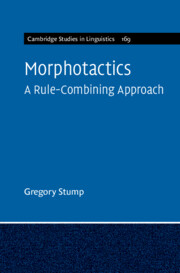Book contents
- Morphotactics
- Cambridge Studies in Linguistics
- Morphotactics
- Copyright page
- Dedication
- Contents
- Figures
- Tables
- Preface and Acknowledgments
- Abbreviations
- Symbols and Operators
- 1 Canonical Morphotactics
- 2 Rule Combinations
- 3 Dependent Rules and Carrier Rules
- 4 Rule Composition and Rule Ordering
- 5 Extending Canonical Morphotactic Criteria to Composite Rules
- 6 Rule Combinations Expressing Holistic Content
- 7 Rule Aggregation
- 8 Complex Morphotactic Interactions in Swahili
- 9 The Nonassociativity of Rule Composition in Murrinhpatha
- 10 Potentiation and Counterpotentiation
- 11 Rule Combinations and Morphological Simplicity
- 12 Rule‑combining Morphotactics and Morphological Theories
- 13 Conclusions
- References
- Index
11 - Rule Combinations and Morphological Simplicity
Published online by Cambridge University Press: 24 November 2022
- Morphotactics
- Cambridge Studies in Linguistics
- Morphotactics
- Copyright page
- Dedication
- Contents
- Figures
- Tables
- Preface and Acknowledgments
- Abbreviations
- Symbols and Operators
- 1 Canonical Morphotactics
- 2 Rule Combinations
- 3 Dependent Rules and Carrier Rules
- 4 Rule Composition and Rule Ordering
- 5 Extending Canonical Morphotactic Criteria to Composite Rules
- 6 Rule Combinations Expressing Holistic Content
- 7 Rule Aggregation
- 8 Complex Morphotactic Interactions in Swahili
- 9 The Nonassociativity of Rule Composition in Murrinhpatha
- 10 Potentiation and Counterpotentiation
- 11 Rule Combinations and Morphological Simplicity
- 12 Rule‑combining Morphotactics and Morphological Theories
- 13 Conclusions
- References
- Index
Summary
Rule combination can contribute to morphological simplicity. Synchronically, rule combinations (like word combinations) are sometimes stored as formulaic units, and this fact contributes to a morphological system’s processing simplicity, since accessing a stored rule combination directly is simpler than decomposing that combination into its component rules for separate lookup. Stored, formulaic rule combinations may also contribute to diachronic simplifications of a language’s morphology, since they are the locus of reanalyses that may eventuate in “affix telescoping,” the development of a rule combination into a simple rule. But affix telescoping is not a monolithic phenomenon; it involves the reduction of a rule combination’s combinatory transparency along at least four dimensions. Thus, it is possible to find rule combinations that are progressing toward reanalysis as simple rules without yet having reached the point of reanalysis.
Keywords
- Type
- Chapter
- Information
- MorphotacticsA Rule-Combining Approach, pp. 321 - 343Publisher: Cambridge University PressPrint publication year: 2022

